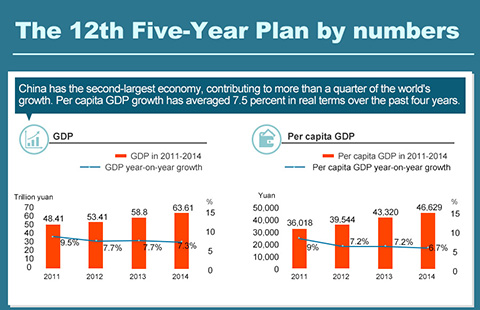Fruitful China-Britain energy cooperation sets model for global climate battle
(Xinhua) Updated: 2015-10-27 14:08Among the business contracts signed during Xi's recent state visit to Britain is a multi-billion-dollar supply deal of liquefied natural gas (LNG) between British oil giant BP and Huadian, China's largest gas-fired power producer.
In June, State-owned Chinese company China Harbor Engineering Company (CHEC) won a $460 million contract to build the world's first tidal energy power plant in Britain's Swansea Bay, which is expected to generate power enough for 120,000 homes.
In December 2014, China General Nuclear (CGN), the company that leads the Chinese consortium in the Hinkley Point C project, acquired an 80-percent stake in three British onshore wind farms from EDF.
In June 2014, during Chinese Premier Li Keqiang's visit to Britain, BP signed with Chinese offshore oil producer CNOOC a $20 billion LNG supply contract. Under the deal, BP would supply up to 1.5 million tons of LNG per year for 20 years starting in 2019.
In April 2014, a 12-megawatt solar power plant invested and built by Chinese company Avic International was delivered to the British side. The Spriggs solar farm has been connected to the grid since March and its daily output in summer time can satisfy the power needs of 2,500 families.
According to a recent report released by Pinsent Masons, a full-service international law firm based in London, with more Chinese investment streaming into British infrastructure, the energy sector will be the largest beneficiary, particularly nuclear energy, wind power and solar power.
Towards a greener future
While striding forward with their fruitful energy cooperation, top leaders in both China and Britain are well aware of the challenges posed by climate change.
On many occasions during his British trip, Xi spoke highly of the achievements scored by the two countries in their pursuit of green development and called for continued efforts in policy coordination and practical cooperation.
In a new sign of their steadfast efforts in tackling climate change, the two countries inked during Xi's visit a memorandum of understanding on forging a partnership on clean energy.
Moreover, in a landmark joint declaration on building a "global comprehensive strategic partnership for the 21st century," the two countries specified several key areas of bilateral cooperation and tackling climate change is one of them.
It is safe to say that China and Britain have got immense economic motives and strong political will to usher in a greener future for themselves and also for the whole world.
- 'Golden time' approaching for Chinese students in Britain to start business
- Top 10 degrees that provide highest paid jobs in UK
- Belt and Road helps China become net capital exporter: Report
- China, Britain strengthen cooperation to push yuan's global use
- China, Britain raise curtain of 'golden time' in ties with $60b deals
- Fruitful China-Britain energy cooperation sets model for global climate battle
- They live in Russia, but shop in China
- China, S.Korea, Japan to hold commerce ministers' meeting in over 3 years
- JD.com and Tencent expect big numbers in Nov 11 e-shopping event
- China's unemployment rate slightly up
- China's Sept industrial profits narrow decline
- Silk Road Fund to invest $100m in Chinese company's IPO
- REX set to take control of Yota with $100m deal














